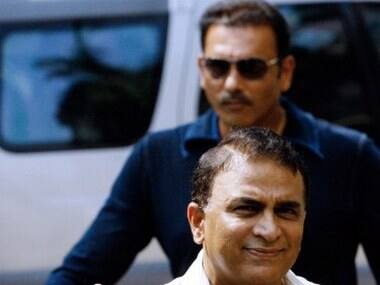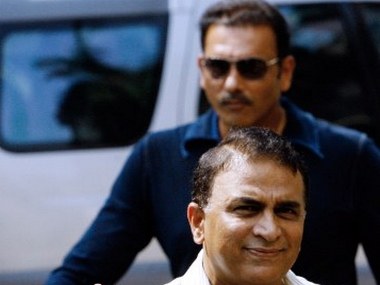By Rahul Fernandes While the Indian team spent most of the week picking up the pieces after their terrible loss at Trent Bridge, the perennially cricket- and gossip-hungry masses needed to be administered a dose of shock. So, a Mumbai tabloid front-paged a story that, it admitted, was an ‘open secret’. Sunil Gavaskar and Ravi Shastri, it said, were paid Rs 3.6 crore annually by the Board of Control for Cricket in India (BCCI) to fill in as commentators for any international match played in India, the IPL and the Champions League. The story assumes importance because Gavaskar and Shastri have, for long, been the most respected voices in Indian cricket. That their clichéd commentary is the butt of all jokes on Twitter is another matter altogether. The question is, would they remain objective in their assessment of the BCCI while they are on its payroll. Would we, the viewers, ever hear their independent opinions? Or, would we be subjected to jingoistic tripe? [caption id=“attachment_55607” align=“alignleft” width=“380” caption=“Gavaskar and Shastri have, for long, been the most respected voices in Indian cricket. Sajjad Hussain/AFP”]
 [/caption] Most publications have followed up on this story, questioning the conflict of interest. Gavaskar and Shastri have rubbished the allegations and gone to great lengths to explain how they are unbiased. The argument is unlikely to cut much ice and is more than likely to die down in a few days. For all practical purposes, Gavaskar and Shastri are like freelancers, offering their services to different organisations while enjoying a retainership with the Big Daddy of cricket. There’s clearly a conflict of interest. But what about journalists working in media organisations which are closely linked to the BCCI? For instance, those that own IPL teams. Or, those that own media rights of the IPL. Can they be objective while covering cricket’s biggest tamasha? Or let’s rephrase it: Will their management allow them to be objective? Will they ever expose a scam in the BCCI? Will they ever tell it the way it is? Your guess is as good as mine. In January this year, just a month before the start of the ICC Cricket World Cup, the Wankhede Stadium was struggling to complete its renovation work and looked in danger of losing the right to host the final. Most journos feared a Commonwealth Games-like situation and went after the BCCI. All it took to allay everyone’s (read ICC) suspicions was an article in a leading daily saying that Wankhede was ready. The article was published on the very day the ICC chief visited Mumbai to hit the gong at the Bombay Stock Exchange and mark a 30-day countdown to the World Cup. Needless to say, a few days later Wankhede got the green signal. Interestingly, about eight weeks later the company that owns the publication was among a consortium that won digital rights to the IPL for a four-year period. Did someone say ‘conflict of interest’? The writer, a former sports journo, now works for in.com, and writing for Firstpost, he believes, is not a conflict of interest.
[/caption] Most publications have followed up on this story, questioning the conflict of interest. Gavaskar and Shastri have rubbished the allegations and gone to great lengths to explain how they are unbiased. The argument is unlikely to cut much ice and is more than likely to die down in a few days. For all practical purposes, Gavaskar and Shastri are like freelancers, offering their services to different organisations while enjoying a retainership with the Big Daddy of cricket. There’s clearly a conflict of interest. But what about journalists working in media organisations which are closely linked to the BCCI? For instance, those that own IPL teams. Or, those that own media rights of the IPL. Can they be objective while covering cricket’s biggest tamasha? Or let’s rephrase it: Will their management allow them to be objective? Will they ever expose a scam in the BCCI? Will they ever tell it the way it is? Your guess is as good as mine. In January this year, just a month before the start of the ICC Cricket World Cup, the Wankhede Stadium was struggling to complete its renovation work and looked in danger of losing the right to host the final. Most journos feared a Commonwealth Games-like situation and went after the BCCI. All it took to allay everyone’s (read ICC) suspicions was an article in a leading daily saying that Wankhede was ready. The article was published on the very day the ICC chief visited Mumbai to hit the gong at the Bombay Stock Exchange and mark a 30-day countdown to the World Cup. Needless to say, a few days later Wankhede got the green signal. Interestingly, about eight weeks later the company that owns the publication was among a consortium that won digital rights to the IPL for a four-year period. Did someone say ‘conflict of interest’? The writer, a former sports journo, now works for in.com, and writing for Firstpost, he believes, is not a conflict of interest.
Cricket, journalism & conflict of interest
FP Archives
• August 6, 2011, 15:49:13 IST
The ‘conflict of interest’ controversy involving Gavaskar, Ravi Shastri and BCCI is generating a lot of interest in the media. Interestingly, it’s a case of selective amnesia when the media are in a similar situation.
Advertisement
)